|
“WHO SO EVER WILL” SUNDAY
LECTIONARY COMMENTARY
Sunday, October 14, 2012
Melinda Contreras-Byrd, Guest Lectionary Commentator
Ministerial staff, Grant Chapel AME Church, Trenton, NJ, and licensed psychologist and owner of The Generations Center
Lection – Romans 10:11-13 (New Revised Standard Version)
(v. 11) The scripture says, “No one who believes in him will be put to shame.”
(v. 12) For there is no distinction between Jew and Greek, the same Lord is Lord of all and is generous to all who call on him. (v. 13) For, “Everyone who calls on the name of the Lord shall be saved.”
I. Description of the Liturgical Moment
The unique history of African Americans demonstrates a call to understand diversity and to champion the struggle for human dignity and inclusivity. From 1619, through slavery, we struggled for freedom and against discrimination. We struggled to name ourselves . . . “Colored,” “Negro,” “Black,” “African American.” And by God’s grace, our struggle led to not just our own empowerment, but empowered diverse groups in the U.S. and around the world.
U.S. Latinos spurred on by the civil rights movement learned to define and celebrate themselves, exchanging “Hispanic” for “Latino” and “Chicano,” shouting cries of “Viva La Raza.”
People of the African Diaspora living in India also responded, exchanging the name “untouchable” for the name “Dalit” (meaning crushed and broken). In April of 1972 they formed “The Dalit Panther Party,” verbalizing solidarity with and encouragement from the struggles of African Americans.
We watched our television screens in horror during the 1989 Chinese student protest in Tiananmen Square. Pictured on the pages of The New York Times was student leader Peng Rong wearing a handmade t-shirt with the words that empowered their protest: “We shall overcome!”
In 2012 we again arise with a spirit to understand and welcome all those who are in the storm.
II. Biblical Interpretation for Preaching and Worship: Romans 10:11-13
Part One: The Contemporary Contexts of the Interpreter
I elected to embrace a Christian lifestyle while a pre-teen growing up in Newark, New Jersey. It was 1965, the era of “Hippy-Black Nationalist-Women’s Liberation-Anti-War-Third World” coalitions. My family was black-non-church going, poor African American-moderate, Cuban-socialists. As an activist, no matter the group, I never fully fit. I believe it was this sense of “otherness” that propelled me toward spiritual, political, theological, “racial,” ethnic, and academic self-discovery. In college I learned to move comfortably within groups that were ethnically, “racially,” and economically diverse.
I returned to my community with a doctorate, a diverse community of friends, and a sense of self that was expanded and inclusive. Yet I failed to recognize another group of people also involved in a struggle. Unlike people involved in racial, ethnic, or class struggles, their struggle had to be waged without the support or guidance of their families or their racial or ethnic groups. They are the GLBTQ communities.
God has honored my desire to understand human struggles for self-actualization and self-determination. I presently serve as a consultant psychologist to young people who are gay, lesbian, bi-sexual, transgender, or questioning. Here I am challenged to see yet another face of God.
Part Two: Biblical Commentary
The youth with whom I work are very definite about their belief that “Christians hate gays!” They tell stories of rejection and inhospitable treatment in the house of God. Yet this portion of Scripture is clear and almost shocking in its use of a language of inclusivity and unconditional acceptance of God-choosers. It uses the words “no one,” “no distinction,” “all,” and “everyone.” But the remarkable thing is that it audaciously uses these terms with no qualifiers! Although the inclusivity of this text jumps out at us, we might overlook this fact in favor of an exegesis that will enable us to discount or exclude someone.
We are fearful when we hear God say, “No one who believes in him will be put to shame”—without adding specifics, explanations, and caveats. How can there be no distinction between the Jew and the Greek? How can God make no distinction between a group who devoutly keeps laws and offers good works and those who have no history of doing either? And while we are at it, where is the justice in a vineyard owner’s payment of the same amount to workers whose work differed in length and strenuousness? How is it fair that a father would celebrate a prodigal son while ostensibly failing to do so for the conformist son? The answer to these questions is the same. Unlike our way of thinking, in all of these situations the criteria for judgment is not a matter of anyone’s ability. The power of our text and the strength of these parables lie in an understanding of the nature of God and the dispensation of grace.
We all differ in so many ways that true fairness must be measured by love. When this is done, my weaknesses, my failures, my challenges in my attempts to succeed don’t impede me from operating on a level playing field. Even if I cannot keep up with another or win after giving it my all, I do not lose. We still both win, because it is not my ability but God’s love that makes the difference. When we understand and embrace this characteristic of God, God’s unending love and grace become the critical foundation pieces for our ability to accept others as we have been accepted. Then we can honestly offer, “Who so ever will . . .”
When we understand that faith in God is the only non-negotiable, then we realize that there is then no distinction between those whom society calls righteous and those whom they do not. “The same Lord is Lord of all and generous to all who call on him.”
The text’s promise is to “everyone who calls on the name of the Lord.” This means everyone who invokes the name of God, everyone who believes in God, everyone who has faith in God. And as much as we might be tempted to add a disclaimer to narrow down who qualifies as a true believer or who is worthy to invoke God’s name, honesty dictates that we admit that we cannot judge the heart.
But we can open the doors of God’s House on Sunday mornings, willing to welcome and act in love toward all those who enter in search of transformation. We can admit to our discomfort with “whosoever,” “all,” and “everyone,” but struggle to change the story that someone from the GLBTQ community will tell about their journey toward God and the people whom she or he encountered during their search.
Some congregations may not feel able to honestly “affirm” but must admit that we are all called to love and to welcome. In order to do these things, we must commit to engage in a struggle that will educate and sensitize us to every aspect of what it means to be in the storm.
Challenge
“Who So Ever Will Sunday” offers an opportunity for congregations to struggle with all aspects of what it means to be a welcoming community. While African American churches have been home to many GLBTQ Christians, their presence has often been unknown or unacknowledged. While we may not be able to agree on every issue, we can agree that we are called to demonstrate love and hospitality, and to offer those who are in the storm a place of warmth and respite. We can agree that even in our weakness, God honors us with holy presence. We can do no less for our brothers and sisters than to listen and care about their struggle to be.
“Who So Ever Will Sunday” offers the challenge to preach a word of love, and love only; to say, “God loves you” with no need to qualify, specify, or add a disclaimer.
Descriptive Details
The descriptive details of this passage include:
Sights: A circle of happily interacting people with one lone person standing on the outside of the circle; a lesbian or transgendered person nervously trying to find something to wear to church that will not bring ridicule or rejection nor make them feel that they are in someone else’s clothing; black ushers in black and white who hand a GLBTQ person a fan and with a smile seats her or him; a diverse congregation of worshipers with hands lifted in praise;
Feelings: The relief and joy of feeling accepted by those who know who you are; the security of a place of respite where you can be open in your struggle, knowing you will be loved and accepted; hope that all struggles will be redeemed; a sense of unity and commonality because we are people who share the experience of being in a human body and seek to be transformed by the renewing of our minds; and
Sounds: A chorus of multi-lingual, diverse praise; the creaking sound of an old door that has long been shut, opening wide for entry.
III. Other Material That Preachers and Educators Can Use
Books
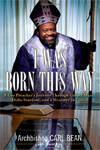 |
Bean, Carl. I Was Born This Way. New York, NY: Simon & Schuster, 2010. |
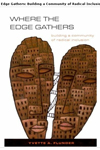 |
Flunder, Yvette. Where the Edge Gathers: Building a Community of Radical Inclusion. Cleveland, OH: Pilgrim Press, 2005. |
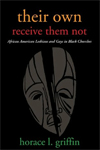 |
Griffin, Horace L. Their Own Receive Them Not: African American Lesbians and Gays in Black Churches. Eugene, OR: Wipf & Stock Publishers, 2010. |
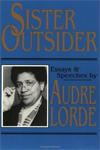 |
Lorde, Audre. Sister Outsider. Berkeley, CA: The Crossing Press, 1984. |
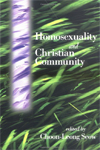 |
Seow, Choon-Leong. Homosexuality and Christian Community. Louisville, KY: Westminster John Knox Press, 1996. |
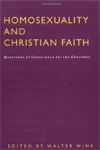 |
Wink, Walter, ed. Homosexuality and Christian Faith: Questions of Conscience for the Church. Minneapolis, MN: Augsburg Fortress Publications, 1999. |
Films
“Prayers for Bobby.” Once Upon A Time Films LTD, LifeTime, 2009.
“For The Bible Tells Me So.” Bruce Bastian, et al, First Run Features, 2007.
“Angels in America.” Tony Kushner, HBO, 2003.
“The Laramie Project.” Moises Kaufman, HBO, 2002.
| 
